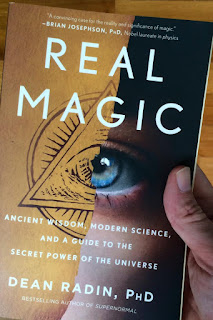 |
| I love the cover for REAL MAGIC, by Dean Radin. |
To begin with, we must first evaluate the efficacy of any argument for such a controversial topic. After all, the science of psychology has shown that folks tend to measure the world by their own experiences (recency bias), to look for and trust information that corroborates their beliefs (confirmation bias), and to generally react from uncomfortable emotions when faced with conflicting facts (cognitive dissonance). Meanwhile, even the hard science of physics has fallen victim to perspective dependence. Consider the how the famous double-slit experiment within quantum physics demonstrates the influence an observer can make on an experiment. Would not the measurement and repeatability of meta-physics fall victim to similar difficulties? In fact, Radin makes this exact argument.
We only see what we want to see; we only hear what we want to hear. Our belief system is just like a mirror that only shows us what we believe. - Radin, REAL MAGIC, Ch. 6, p. 122.
How is evidence provided for this statement? As it's done throughout the book, Radin walks through a meta analysis of scientific research and historical documents. In Chapter 6 of this book, Radin investigates the greater Scientific Evidence for magic. One remarkable essay explores The Role of Belief in the scientific research of magic. This particular idea is examined by introducing a study conducted in the 1940s by Gertrude Schmeidler at City College of New York. This Sheep and Goats experiment had a hypothesis that people who don't believe in magic subconsciously avoid magical experiences because they don't want to experience them. Contrariwise, those who do believe in magic and want to see it, find it. To test this hypothesis, study participants were given a questionnaire covering their beliefs on magic. They were subsequently classified into 'sheep' (i.e. believers) or 'goats' (i.e. skeptics). Each participant then took part in the same psi test, testing their own inherent magical abilities. Schmeidler found that believers, sheep, tended to score above chance in magical experiences, while skeptics, goats, scored below chance. Radin then provides other examples of how this study was replicated and conclusions verified.
In this way, REAL MAGIC spends about one third of its pages (77 of 222 article-style) reviewing some three thousand laboratory experiments and scientific studies that provide convincing evidence for magic. Within the scientific community, magical principles are not labeled as such. Psychic phenomena are abbreviated with the term psi (pronounced "sigh") and are studied within the scientific discipline of parapsychology. This subset of psychology has a long research history, requires scientific repeatability and non-bias, and shows high levels of statistical significance. REAL MAGIC introduces this field with summaries of over one hundred referenced studies. These studies of psi experiences include telepathy, clairvoyance, precognition, and psychokinesis. Explanations of how psi has been studied fall into six classes of experiments:
- Telepathy - Where knowledge, emotions and/or images are shared between the minds of isolated people, which has been measured with a protocol called the ganzfield.
- Remote Viewing - Otherwise referred to as clairvoyance or precognition, this protocol tests an individual's ability to perceive information beyond space and time.
- Presentiment - The measurement of unconscious psychological reactions to future or distant events.
- Implicit Precognition - Testing how future events influence present-time behavior.
- Random Number Generators (RNG) - Testing how personal will can influence the outcome of future, random events generated by truly random, electron tunneling in electronic circuit components.
- Global Shared Consciousness - A world-wide RNG study establishing global baselines and exploring how mass affecting events influence RNG outcomes.
For anyone looking for scientific evidence of magic, this chapter is a must read. Still, REAL MAGIC does not merely focus on being a review of scientific literature. It goes into magic's ancient history, recent practice, and modern theories. REAL MAGIC provides deep diving chapters on popular opinions of magic, the historical origins of magic, the practice of magic, the scientific theories for the causes of magic, and the biographies of three historically recent practitioners. For each topic, Radin uses a meta-approach and provides interesting stories, pointed questions, and detailed references. While it's clear the author has a firm belief, Radin attempts to answer each side of any argument to the best ability. Radin's scientific shines strongest and comes through in the explanation of research and balanced arguments. If you're looking to further explore scientific studies of magic, consider Radin's 2006 book, Entangled Minds: Extrasensory Experiences in a Quantum Reality.
 |
| I just had to read Entangled Minds after REAL MAGIC. |
Finishing REAL MAGIC was an easy thing to do, and I devoured the book. What struck me most is how instead of trying to explain the origins and source of these effects, the book simply describes evidence and asks the reader to seek further truth. While many have personally felt magic in their lives, there seems a pressure to do one of two things. We are either to write it off, as the trick of fraudsters and the foolishness of the superstitious. Otherwise, we are to ascribe it to some cosmic being, religion or dark entity. But is that not how scientific exploration works. We do not need to understand the why something is to measure how it behaves. Meanwhile, to ignore the evidence leaves us to cling to a comfortable ignorance.
What are your thoughts on the scientific study of magic? What are your personal experiences with the miraculous? Could there ever be sufficient evidence to sway skeptics?